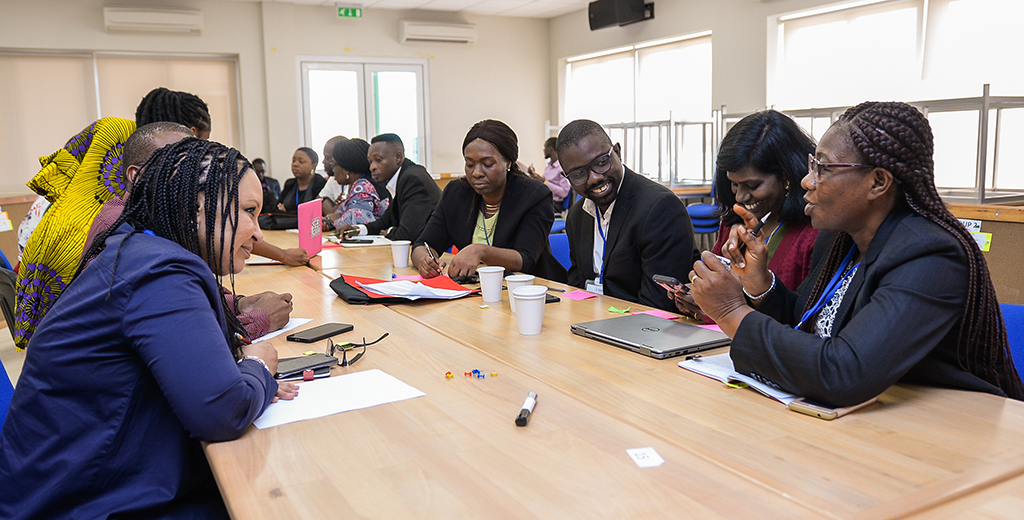
July 28, 2020
The Education Collaborative brings together institutions committed to transforming Africa through high impact education innovation. Participants include public and private universities from across Africa as well as a select group of Ghanaian high schools. Each participating institution has the potential to impact multitudes of colleagues and students. By spreading the effective models Ashesi has developed as well as empowering other institutions to share their own best practices, the Education Collaborative has the potential to impact over 1 million students across Africa.
The ongoing Covid-19 pandemic has resulted in unparalleled disruptions as thousands of schools are closed and over eight million higher-ed students are out of school in Africa alone. Yet, in the midst of this, there has been a series of speedy creative and innovative actions unique to the African context, creating a new narrative of education on the continent. Schools, with prior face-to-face instruction, are adapting unusual e-learning technologies, re-training faculty, and staff, and restructuring pedagogy to ensure continuity of studies. It’s been clear that in tackling the present disruption, we’ve discovered new strength and disposition to innovate, rethink, and build robust educational systems that will prepare the next generation of African leaders.
The 2020 Education Collaborative virtual conference explored context-specific successful university strategies, administration, teaching and learning approaches in this period and obtained insight on ways to capitalize on our innovations to create a “new normal” for institutions in the near future for the transformation of the African continent.
Sessions
The COVID-19 test of Ghana’s educational system: policy implications and new pathways
Panel moderated by Kwesi Sam (AAU) and featuring Hon. Dr. Osei Yaw Adutwum (Deputy Minister of Education), Prof Jane Naana Opoku-Agyemang (AWU) and Dr. Nii Moi Thompson (National Development & Planning Commission)
In Ghana, schools from the basic to the tertiary levels have remained closed for the last two months, with its related challenges. This session assessed the educational system, the lessons we’ve learned, the gaps that have arisen, and the challenges we’ve overcome, and chart new pathways to maximize the almost-disguised-opportunities that this pandemic has opened up for education delivery in Ghana.
Transitioning online: contextual realities of the strategic decision to-go or not-to-go online
Panel moderated by Araba & featuring Yasmin, Kader Kaneye (ADU), Baylie Yeshita (Kepler), and Charles Barnor (University of Professional Studies)
The COVID-19 pandemic has no doubt brought education leaders to the point of making some of the toughest decisions in their careers. Transition online or not to transition online, and to what extent. In our African-context, that decision is not a simple go-no-go-decision. University leaders, therefore, explored the continent-specific, institution-specific challenges and its future implication of university administration in Africa.
What next? Implications of our new normal on teaching and learning in Africa
Breakout session facilitated by Hayden Noel (University of Illinois Gies College of Business)
Higher-ed institutions with prior face-to-face instructional pedagogies have redesigned courses to match with the online teaching and learning. How and what can we carry forward to transform how we teach and learn for the better? This session unpacked the approaches adopted in this period and what it holds for the future of instruction in African higher institutions.
Parallel Sessions
Workshop A
Round Table: Re-thinking remote access online for students with disability
Moderated by Dr. Millicent Adjei (Ashesi University) and featuring Angela Affran (Perkins International), Derrick Omari (Tech Era), and Alex Williams (University of Ghana)
As schools adopt remote learning channels during this COVID-19 pandemic, are the needs of students with disabilities being fully considered? What are some of the opportunities that these transitions have presented for the inclusion of students with disabilities, and what are some of the challenges faced in developing institutions’ capabilities to support in this period. What lessons and practicalities does this hold for the future of instruction and administration of higher-ed in Africa?
Workshop B
Preparing students for the future world of work during the new normal
Facilitated by Dr. Esi Ansah (Educator, Founding Partner and CEO of Axis Human Capital Ltd)
A World Bank report indicated that the expeditious change in technology, information, and related developments are creating corresponding changes in the world of work on the continent. The present pandemic has fast-tracked this change with the emergence of new forms of work; with remote working revealing new possibilities for expenditure and resource management. The nature of work post-COVID19 will likely take on a new look that will require new strategies for talent and career development. Educators and stakeholders from industry will join this session to look into this trend and identify new administrative and teaching approaches to adequately prepare students for a changing future of work.
To learn more about the Education Collaborative, click here.
Share this story
